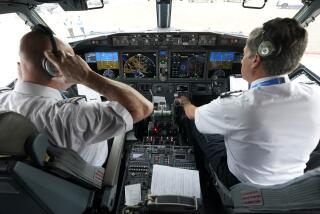Elite Group Has Powerful Clout in Airline Industry
NEW YORK — The Air Line Pilots Assn., which Friday joined management of UAL Corp. in a bid to buy the airline company, has never been a traditional blue-collar labor union.
Most of its members have college degrees. Many own businesses on the side. And the pilots are among the nation’s best-paid union laborers with annual salaries topping $80,000.
But it is still a labor union. And in the last decade, since deregulation of the nation’s airline industry, it has had to defend its interests against takeover artists seizing control of the airlines and against financiers who often pay more attention to the bottom line than to the quality of service or the welfare of employees.
As a result, out of sheer necessity and in order to survive in the deregulated world, ALPA has hired top corporate lawyers and premier Wall Street investment firms. Indeed, it has become so sophisticated and so wealthy that it can now contemplate owning an airline.
“We are trying to deal with the world of corporate finance and administration on an equal footing,” said an ALPA official at the union’s national headquarters in Washington who would speak only on the promise that he would not be identified. “We want a level playing field.
“If bankruptcy or something like that is a possibility, we are going to retain advisers and experts who will put us on equal terms with the corporate experts so that we will not be bamboozled by corporate double talk. In fact, many times our experts enable us to know more about a situation than the other side knows. This approach carries over into all corners of the corporate boardroom, including such things as employee stock option plans and leveraged buyouts.”
Management Ousted
Indeed, it was the United Airlines’ pilots union, when it unsuccessfully bid about $4 billion for the airline two years ago, that alerted Wall Street to the true asset value of the airline’s parent company--then called Allegis Corp.; now called UAL.
The result was that then-Chairman Richard Ferris’ dream of creating a full-service travel company was killed. Top management, including Ferris, was ousted. The non-airline subsidiaries--two hotel chains and the Hertz car rental operation--were sold, with the proceeds being paid to shareholders.
“The pilots threatened to take over the company,” said Prof. Frank Spencer of Northwestern University’s Transportation Center. “They went to the stockholders’ meeting with their pitch, and Wall Street people listened. They were not successful in their takeover attempt, but they were instrumental in what happened to the company.”
ALPA’s post-deregulation clout has also manifested itself elsewhere.
Noting the union’s ability to thwart an attempted takeover of Trans World Airlines by Frank Lorenzo, an arch foe of labor, in 1985, the union official added: “Fifteen years ago, this union would not have had the knowledge or ability or muscle to have been able to stop something like that.”
It remains to be seen if the ALPA-management bid for UAL will succeed. And if it does, it is not yet clear how deeply the union will involve itself in the day-to-day operation of the airline.
When United’s pilots made their previous bid to buy the carrier, they hired William R. Howard, a respected airline executive who had once headed Piedmont Airlines, to direct their acquisition effort and, if it had been successful, to run the Chicago-based carrier.
Like Other Owners
The current effort would involve 75% ownership by employees (led by the pilots), 10% by UAL’s current management and 15% by British Airways. If it is successful, observers expect that in this case as well the pilots would stick to their primary task: flying the planes.
“They would be like any other airline owners,” said Robert Decker, an airline analyst with the investment firm of Duff & Phelps in Chicago. “They would hire professional airline managers to run the company.”
Paul Turk, an official of Avmark Inc., an Arlington, Va., aviation marketing and management service, concedes that in the early days of aviation, pilots ran the airlines. He points to Eddie Rickenbacker, the founder of Eastern Airlines who headed the carrier for decades, as just one of those pilot-manager pioneers.
But running an airline has become too complex today, Turk maintains.
“They might take a seat or two on the board,” Turk said. “But a pilot won’t be the chief executive or the chief operating officer. In the last 15 or 20 years, the pilots have not had a very good track record in running airlines.”
“Take Pride Air or McClain Air and others. They were post-deregulation upstarts created by pilots. They are gone now. The pilots have been found wanting in terms of management of the complex financial empires, which the airlines have become.”
Union ownership would undoubtedly improve United’s profitability, observers said.
Prof. Charles Craypo, chairman of the economics department at the University of Notre Dame, recalled that productivity improved greatly after unions made concessions at Eastern Airlines some years back and got stock ownership and four board seats in exchange.
“If the pilots feel they have a stake in the airline, they will do things that will make the airlines more efficient than the way they have done it in the past. We could reasonably expect that there will be substantial gains in productivity, improved passenger-employee relationships. Experience has shown that there have been big jumps in measured productivity.”
More to Read
Inside the business of entertainment
The Wide Shot brings you news, analysis and insights on everything from streaming wars to production — and what it all means for the future.
You may occasionally receive promotional content from the Los Angeles Times.










